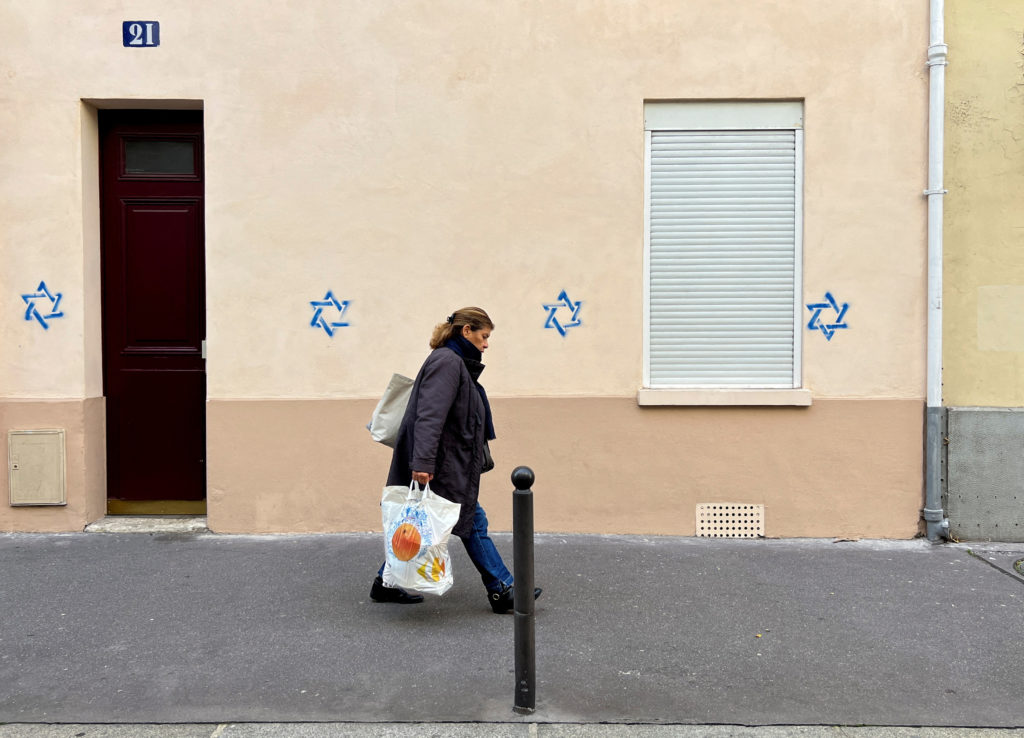France blames Russia for an online effort to whip up controversy over Stars of David graffiti

PARIS (AP) — France says it has been the target of a Russian online destabilization campaign that used automated social-media accounts to whip up controversy and confusion about spray-painted Stars of David that appeared on Paris streets and fed alarm about surging antisemitism in France during the Israel-Hamas war.
The 250 or so quickly erased blue stars are now the subject of French police investigations seeking to determine whether the graffiti were antisemitic, as Paris’ police chief and others initially suspected, and if they were organized from outside France.
The stars’ stenciling on walls in Paris and its suburbs last month quickly fomented debate and alarm on social media and concerns about the safety of France’s Jewish community, the largest in Europe.
Since Hamas attacked Israel on Oct. 7, triggering their latest and deadliest war, French authorities have counted more than 1,150 antisemitic acts. That’s nearly three times more than all acts against French Jews in 2022, the Interior Ministry says.
In a statement Thursday evening, France’s Foreign Ministry pointed a finger of blame at Russia, saying a Russian network of bots whipped up controversy about the stars with thousands of posts on X, the platform previously known as Twitter. Bots are automated accounts programmed to mimic human users by generating messages or following users on social media, often for nefarious or malicious purposes.
WATCH: Thousands of civilians flee northern Gaza hospitals as Israeli troops close in
“This new operation of Russian digital interference against France testifies to the persistence of an opportunistic and irresponsible strategy aimed at exploiting international crises to sow confusion and create tensions in the public debate in France and in Europe,” the statement said.
It said the bots were affiliated with a Russian network — Recent Reliable News, also identified as Doppelgänger.
The Russian activity was detected by Viginum, a French state digital watchdog set up in 2021 after hackers targeted Emmanuel Macron ‘s successful campaign for the French presidency in 2017. The core mission of Viginum is to detect and analyze foreign digital efforts to influence online public debate in France.
Viginum determined that a network of 1,095 bots affiliated with RRN published 2,589 posts on X in under two weeks, “contributing to the controversy surrounding the stenciled Stars of David,” the French Foreign Ministry said.
Viginum also found that the RRN network appeared to have been informed about the graffiti before other posters on X, the ministry said. It said RRN bots first posted about the stars on the evening of Oct. 28 — 48 hours before other photos of the stars started to appear on X.
The European Union has identified RRN as a digital information manipulation campaign that has also disseminated propaganda in support of Russia’s invasion of Ukraine.
As well as using fake accounts on social media, RRN has also employed fake web pages that mimic media outlets and government websites, and “is part of a broader hybrid campaign by Russia against the EU and the member states,” the Council of the EU said in a July announcement of sanctions against Russian individuals and entities deemed responsible for the campaign.
AP journalists John Leicester in Le Pecq, France, and Kelvin Chan in London contributed to this report.
ncG1vNJzZmivp6x7sa7SZ6arn1%2Bjsri%2Fx6isq2enpL%2BtsI6fqZqmk5p6o7jAppysZaKqwLS1wGadqKpdlrtuu82loKedXZqzp7vRrWStp12staq8jK6nZpufo8Gzu9WeqayxXaTDpr6MrKuaqqNivKd5w5qtopxdnL%2BissWiq6I%3D